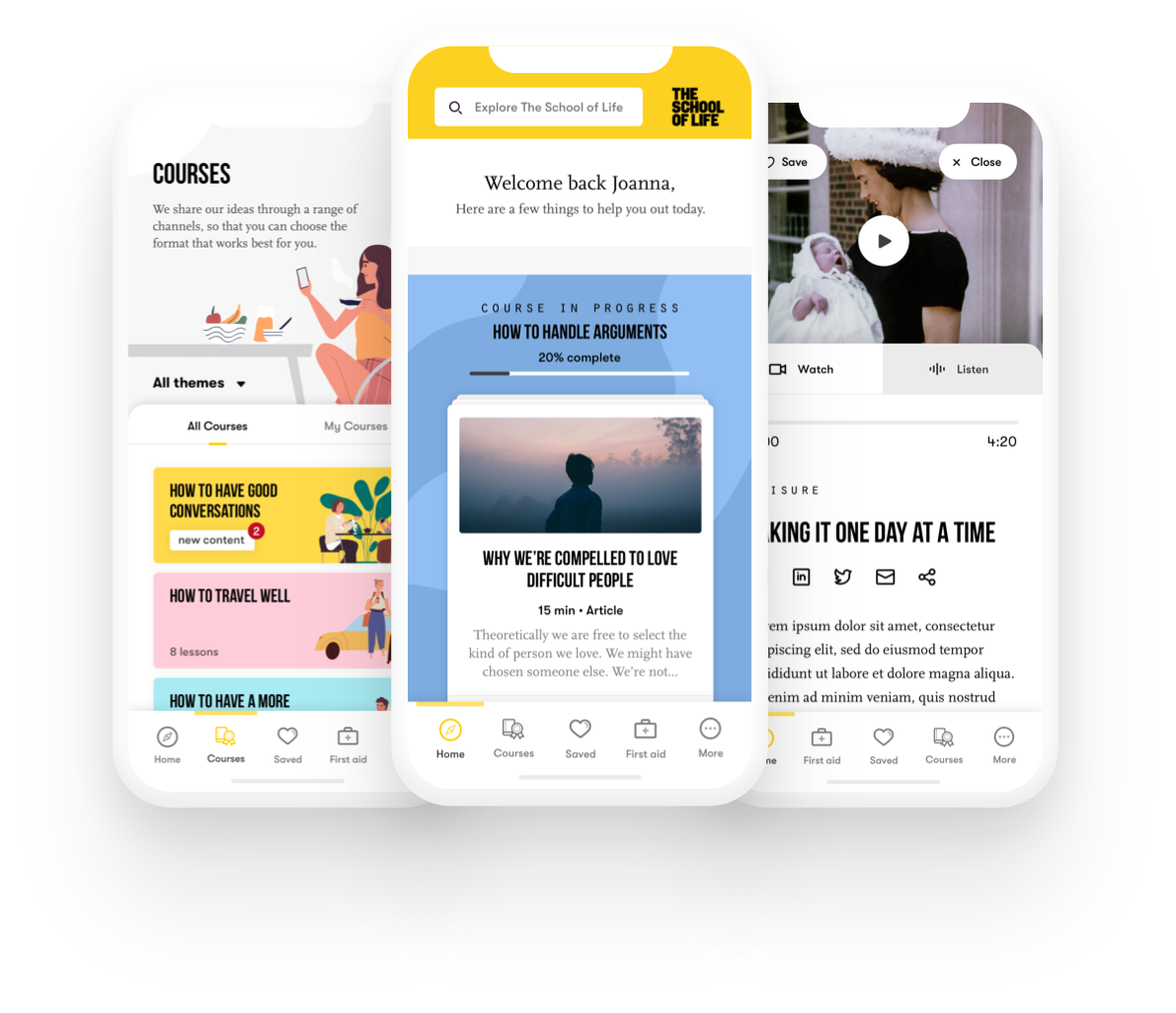To understand ourselves, we need regularly to take regular stock of the thoughts that flow through one’s consciousness.
Insofar as there is public encouragement of the idea, it tends to be according to practices collectively referred to under the term ‘meditation’. In meditation, we strive to empty consciousness of its normal medley of anxieties, hurts and excitements – and concentrate on the sensations of the immediate moment, allowing even events as apparently minor but as fundamental as the act of breathing to be noticed. In a bid for serenity and liberation, we still the agitations of what the Buddhists have evocatively termed our ‘monkey minds’.
But there is another approach to consider, this one based not on Eastern thought, but on ideas transmitted to us via the Western tradition. In Philosophical Meditation, instead of being prompted to sidestep our worries and ambitions, we are directed to set aside time to catch, untangle, examine and confront them.
It is a basic distinctive quirk of our minds that few of the emotions we carry in them are properly acknowledged, understood or truly felt, that most of the thoughts that drive our behaviour exist in an ‘unprocessed’ form within us. Philosophical Meditation seeks to lend us a structure within which to sieve the confused content that muddies our stream of consciousness.
Key to the practice is regularly to turn over three large questions. The first involves asking: What might I right now be anxious about?
We are rarely without a sizeable backlog of worries, far greater than we tend consciously to recognise. Life, properly felt, is an infinitely alarming process even in its apparently calmer stretches. We face an assortment of ongoing uncertainty and threats. Even ordinary days contain concealed charges of fear and challenge: navigating through a train station, attending a meeting, being introduced to a new colleague, being handed responsibility for a task or a person, keeping control over our bodies in public settings – all contain the grounds for agitation that we are under pressure to think should not be taken seriously. We need – during our meditative sessions – to give every so-called small anxiety a chance to be heard, for what lends our worries their force is not so much that we have them but that we don’t allow ourselves the time to know, interpret and contextualise them adequately. Only by being listened to in generous, almost pedantic detail will anxieties lose their hold on us. At almost any time, within our minds, a chaotic procession flows which would make little sense if recorded and transcribed: ‘… biscuits to the train why earrings deal they can’t do it I have to Milo phone list do it the bathroom now I can’t do, 11.20, thirty three per cent it a 10.30 tomorrow with Luke why invoices separately detailed why me trees branches sleep right temples…’ But such streams can gradually be tamed, drained, ordered and evaporated into something far less daunting and illogical. Each word can be encouraged to grow into a paragraph or page and thereby lose its hold on us. We can force ourselves to imagine what might happen if our vague catastrophic forebodings truly came to pass. We can refuse to let our concerns covertly nag at us and look at them squarely until we are no longer cowed. We can turn a jumble of worries into that most calming, and intellectually noble, of documents: a list.
A Philosophical Meditation moves on to a second enquiry: What am I presently upset about? This may sound oddly presumptuous, because we frequently have no particular sense of having been upset by anything. Our self-image leans towards the well-defended. But almost certainly, we are somewhere being too brave for our own good. We are almost invariably carrying around with us pulses of regret, loss, envy, vulnerability and sorrow. These may not register in immediate consciousness, not because they don’t exist, but because we have grown overly used to no one around us giving a damn and have dutifully taken heed, along the course of our development, to recommendations that we toughen up a little. Yet a life among others daily exposes us to small darts and pinpricks: a meeting ends abruptly, a call doesn’t come, an anticipated reunion feels disappointingly distant, someone doesn’t touch us when we needed reassurance, news of a friend’s latest project leaves us envious. We are mental athletes at shrugging such things off, but there is a cost to our stoicism. From small humiliations and slights, large blocks of resentment eventually form that render us unable to love or trust. What we call depression is sadness and anger that have for too long not been paid their dues.
There is a third question we can consider within a Philosophical Meditation: What are we currently ambitious and excited about?
A part of our mind is forever forward-thinking and hopeful, seeking to maximise opportunities and develop potential. Much of this energy registers as vague tension about new directions we might take. We could experience this inchoate restlessness when we read an article, hear of a colleague’s plans or glimpse an idea about next year flit across our mental landscape as we lie in the bath or walk around a park. The excitement points indistinctly to better, more fulfilled versions of ourselves. We should allow our minds to wonder at greater length than usual about what the excitement (it could be a view, a book, a place, an insight) might want to tell us about ourselves.
A period of Philosophical Meditation does not so much dissolve problems as create an occasion when the mind can order and understand itself. Fears, resentments and hopes become easier to name; we grow less scared of the contents of our own minds – and less resentful, calmer and clearer about our direction. We start, in faltering steps, to know ourselves slightly better.
Detailed Description of a Philosophical Meditation
1. Anxiety
Write down what you are anxious about; find at least 8 things.
Each entry should only be a single word (or just a few words) at this point.
Don’t worry if some of the anxieties look either incredibly trivial or dauntingly large. The mind tends to be an almost comedic blend of the two.
If you’re having trouble, search for things that may be anxiety-inducing under the following categories:
– Work
– Relationships
– Children/Parents
– Health
– Money
– Things I have to do
Feel the curious release that can come from just making a list of these items. Huge relief can now come from what we call ‘unpacking’ an anxiety. There are two kinds of unpacking we might do around any given anxiety.
There’s practical unpacking: talk yourself through the practical challenge. Ask the following questions:
What steps do you need to take?
What do others need to do?
What needs to happen when?
It’s very useful to have a calm and sympathetic part of yourself listening in on the detailed description of what needs to be done to address an issue. It’s no longer merely an anxiety. It’s a set of steps. They might not all be easy – but at least you are clearer about what they are.
There’s also emotional unpacking: Talk yourself through an emotional challenge or set of doubts.
Describe the feeling in more detail. What do you feel it points to? Imagine trying to piece it together for a very considerate friend.
The aim here isn’t to solve all anxieties, it’s to start to get to know them and to experience the relief that comes from clarity.
2. Upset
As quickly as you can and without bothering how petty, unreasonable or pretentious it might sound, write a list of current upsets. The more the better. How have others hurt you? What are you sad, distressed, nostalgic or wounded about?
Allow yourself in the present safety of this exercise to be, for instance, furious about the way your partner brushes their teeth (too lackadaisical or too smug); the agents of global politics; your boss saying ‘yeah, right’ in a slightly sarcastic manner; the hotel receptionist who implied you might not be rich enough to stay there; or your mother commenting on your taste in shoes. These are just starting points and every starting point is valid.
Look at your list. Select two ways people have hurt you that particularly preoccupy you – again without considering the objective merits of your irritation. What is it about these things that bothers you? Go into as much detail as possible. Imagine you are pouring your heart out to an extremely sympathetic and patient friend.
Now ask yourself: If this had happened to a friend, how would you advise them? What might you say?
Again, we’re not attempting as yet to resolve these issues. The primary, crucial issue is to get clear about what is actually distressing us. We’re moving from vagueness to clarity.
3. Excitement
Rapidly list several things that have caught your attention and excited your interest since the last Meditation. A word or a brief phrase is sufficient for now.
Your list might (but doesn’t need to) include:
– Moments of envy – when you thought that someone else had something you might quite like to have a version of yourself.
– Daydreams: ideas about how life might ideally be, that you’d maybe feel awkward about telling others, because they might seem far-fetched or greedy or a bit odd.
– How nice someone or something was
– How thrilled someone makes you feel
Select two items that have especially been on your mind. And pass them through a sieve of further questions:
– Describe your excitement as if to a sympathetic, interested friend.
– If you could realistically change your life in certain ways: what would it be to change your life in the light of this?
– This exciting thing holds a clue to what is missing in your life; what might be missing?
– If this thing could talk, what might it tell me?
– If this thing could try to change my life, what changes might it advise?
– If other parts of my life were more like this, what might they be like?
* * *
It would help if we could perform a Philosophical Meditation at least twice a week.










